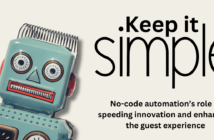Effectively assessing and strengthening your in-house maintenance team
This article is a companion to an article published in the May 2023 issue, which discusses the need for the adequate training of hotel maintenance engineers.
Efficient, reliable maintenance engineers are a critical element of success in the hospitality industry. Guest experience and productivity depend on a team of trained engineers who can dependably keep equipment in working order, make repairs as necessary, and quickly respond to urgent situations.
Recruiting, training, and retaining talented engineers, however, is a chronic challenge across the skilled trades industries, including hospitality maintenance. An ongoing shortage of experienced engineers, an aging skilled-trades workforce, and a historically tight labor market are some of the main factors contributing to today’s hospitality maintenance workforce crisis.
PROPER PREP
Effective training for maintenance engineers has been identified as a key strategy for meeting this continuing challenge. As in other industries that depend heavily on skilled labor, hospitality organizations increasingly recognize the value of thorough training.
With in-house maintenance training, organizations can quickly prepare new engineers for the job and elevate service by continually upskilling experienced engineers. Ultimately, effective training can help companies streamline operations, enhance performance and productivity, ensure continuity, and ultimately boost guest satisfaction – and profitability.
Real-world, measurable benefits of effective training include:
- Increased efficiency and performance: Well-trained engineers can accomplish their tasks faster and more accurately.
- Improved bottom line: Effective training can allow you to contain capital costs and reduce outsourcing expenses. Employees will be able to diagnose issues correctly the first time and will be better able to make repairs instead of opting for replacing equipment.
- Improved guest satisfaction: With cross-trained and continuously upskilled engineers, your team can respond to service calls faster, decrease callbacks, and keep guests happy.
- Higher employee morale and engagement: Creating career pathways improves employee engagement and reduces turnover.
- A competitive edge: Younger generations are increasingly interested in career laddering and formalized in-house training programs that enable growth.
Implementing in-house maintenance training that delivers those results has traditionally been its own challenge. But, new innovative, immersive digital training platforms offer an easier path to effective training than ever before, with flexible features such as learning management, customized learning paths, and cross-training opportunities.
FILL THE GAPS
One of the most important features hospitality managers and leaders should look for in a digital training solution is the ability to accurately assess and measure their teams’ technical skills and progress. Effective skills assessments provide organizations with clear, objective insights that benefit engineers, guests, and the bottom line.
Too often, gaps in knowledge, skills, or training only become apparent on the job. Learning the shortcomings of your training program this way will likely result in guest dissatisfaction, inefficiency, and reduced productivity. When managers can measure the knowledge and technical skills of new engineers before they start, or assess the strengths and weaknesses of existing engineers, they can create and implement the right training path for those employees.
Engineers underperforming on a particular kind of service call can refresh their knowledge and reinforce fundamental skills with focused training, for example. Or, supervisors can intentionally craft and design professional development pathways, creating opportunities not only to upskill employees but to help them advance their careers within the company. Professional advancement is highly valued among young workers, and development pathways can play a pivotal role in effective recruiting by establishing a company as an employer of choice.
Because different employees bring different skill sets to the table, the most efficient training allows managers to customize pathways for each learner. With curated learning paths, technicians learn the right skills, in the right order, and managers can identify skill gaps on their team and address them before they result in a callback.
The unique flexibility, accessibility, and transparency of digital training are transforming how employers in the hospitality industry recruit, ramp, and retain skilled talent.





